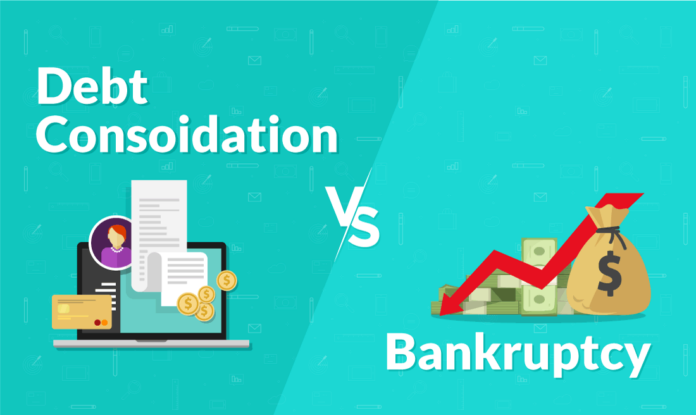Debt consolidation and bankruptcy represent two types of well-known debt management strategies. By consolidating your debt, you rearrange a number of debt payments under one payment.
Optionally, you might decide to consolidate your debts using a secured loan versus an unsecured loan. Conversely, through bankruptcy, certain debts are erased or reorganized while protected by the federal bankruptcy court.
Once your debts start to get unmanageable, both bankruptcy and debt consolidation are two options you should take into account. However, as debt consolidation may be far less harmful to your credit score, it’s not an option for everyone.
What does mean Bankruptcy?

Bankruptcy refers to a legal procedure that is supervised by federal courts and serves to help safeguard individuals and businesses that have gotten over their heads with debt. Bankruptcy relieves you of the debt collection, however, the hassle may continue for years. Non-bankruptcy debt settlement may involve extra time, but when it is handled appropriately, may cause way less harm to your credit score. Being able to comprehend the advantages and disadvantages of debt settlement versus bankruptcy, combined with choosing the wisest option, may have a huge influence on how you handle your finances in the future.
Understanding debt consolidation

Under debt consolidation, you receive one credit to pay off all your other borrowings, so you only have to make one payment to a single creditor a month, instead of paying more than one creditor.
By doing this, you will be able to obtain a smaller interest rate, thereby decreasing the total you need to pay per month.
This involves getting enrolled in a credit consolidation program by a nonprofit loan consulting agency. These agencies may charge you to make payments each month, along with a service fee, to pay an agreed-upon amount to your creditors and continue to do so until your debts are cleared.
Debt Consolidation vs Bankruptcy

Like with a lot of financial issues, there is no one final answer to this one either; determining what is most suitable for you, be it debt consolidation or bankruptcy, all depends on your particular situation.
Consider that in case your financial condition is quite solid and you just exaggerated a little using your credit cards, then debt consolidation will be able to help you get everything under control.
Due to the fact that this choice may be considered less serious than bankruptcy, this is probably the preferable option in this scenario.
On the other hand, when you are in more serious stages of financial difficulty and may be found in a state of drowning under your debts, a debt consolidation loan may just extend the unavoidable.
Going bankrupt is probably the wiser choice in more extreme scenarios. Postponing debt only puts you at risk of a prolonged struggle, whereas bankruptcy may bring you more quickly to the firm financial ground.
Given the complexity of the considerations, perhaps it is wisest to consult with a nonprofit credit counselor such as Mycreditassociates.com Reviews, or a bankruptcy attorney in order to review your case and consider the options.


















